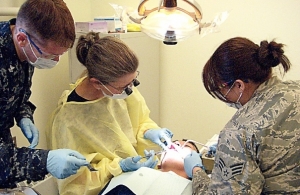916th crew brings care to remote villages
By Kenneth Fine
Published in News on April 27, 2010 1:46 PM

Submitted photo
916th Aerospace Medicine Flight Lt. Col. (Dr.) Frances McClure, in yellow, works on a patient in a remote village in Alaska as part of Operation Arctic Care. When she is not donning her country's uniform, McClure is a dentist at O'Berry Center.
The living conditions were better than the ones Dr. Frances McClure endured during previous stints in Peru, Nicaragua and Paraguay, but the Air Force Reserve lieutenant colonel would tell you the dental health of those living in some of the remote villages in Alaska is far worse than that of those she once treated in South America.
"They have adopted a very refined diet -- packaged foods and sugary drinks," she said. "Most folks, I don't think, really eat the native foods. So there is a huge decay problem."
Dr. McClure, a Goldsboro dentist, is one of four members of Seymour Johnson Air Force Base's 916th Air Refueling Wing who returned this weekend from "Operation Arctic Care," a humanitarian mission that saw airmen, soldiers and sailors converge on 11 remote villages in the country's largest state -- providing free health care to hundreds who might otherwise go without.
"We're learning to mobilize in the event of a disaster like the earthquake in Haiti or a flood situation," said Dr. McClure, who practices at O'Berry Center when she isn't donning her country's uniform. "It's medical readiness training."
But for the schoolchildren and residents of a 450-person village called Buckland, it was much more.
For them, it was a chance to get top-notch care while connecting with the world outside a place most will never see.
"(The) village (we were assigned to) is very remote," Dr. McClure said. "It's only accessible by barge or plane. There aren't any roads leading out."
Operation Arctic Care marked the 16th year members of the U.S. military have traveled to some of the country's most remote areas to treat general health patients and to provide dental, eye and veterinary care.
"We started with school screenings," Dr. McClure said, adding the school in Buckland had only 165 students.
And in addition to caring for children, her team saw roughly 10 patients per day out of a clinic she characterized as pretty nice, considering where it was located.
"It's different (from missions in South America) clinically and living condition wise," she said during one of her last few days in Alaska. "We're staying at a really nice school, and the clinic is very nice. Usually, when we go to other countries, we're staying in schools without all the amenities this one has."
But despite those differences, Dr. McClure found several similarities between her most recent mission and the others she has accomplished during her time in the Reserves.
"It's similar in the kind of conditions we're treating," she said. "But in many cases, it's actually worse here."
And for that reason, this latest trip, she said, was just as rewarding as ones that took her outside the U.S.
"Missions like this, it's probably not why I joined (the Air Force Reserves) but it's ... one of the best parts," she said.
The three other members of the 916th's Aerospace Medicine Flight who went to Alaska were Master Sgt. Julia McKenzie, Capt. (Dr.) Robert Keenan and Tech. Sgt. Chelsea John.
